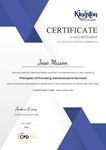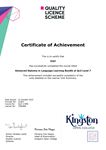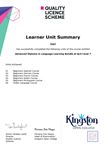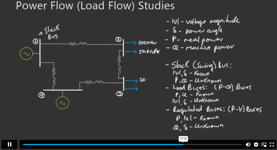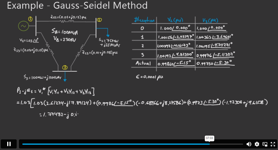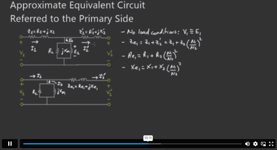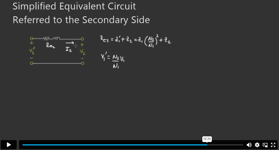
Power Engineering: Power System Analysis
CPD QS Accredited| Instant Access | 24/7 Tutor Support | All-Inclusive Cost
Kingston Open College
Summary
- Exam(s) / assessment(s) is included in price
- Tutor is available to students
Add to basket or enquire
Overview
Know the power system and nail it with Power Engineering: Power System Analysis course, a cornerstone for careers in the UK's energy sector. This course offers vital insights and practical knowledge for professionals in this field. It equips students with the knowledge and skills to navigate and optimise the intricate networks that power our world; it is not merely a theoretical undertaking. The curriculum covers various topics, from investigating generator and transformer models to comprehending power in three-phase AC circuits. This systematic approach equips students to assess and troubleshoot power system problems.
The course is divided into four sections, each focusing on an essential aspect of power system analysis. It begins with the basic ideas of power in three-phase circuits and moves on to more complex topics like load flow analysis and gearbox line models. Practical modules concentrating on short circuit analysis for balanced and unbalanced faults sharpen fundamental skills and equip learners to recognise and handle possible system disruptions. Additionally, the course concludes by examining power system stability under various circumstances, which is essential in guaranteeing a continuous and effective energy distribution.
In addition to opening doors to profitable career opportunities in the energy sector, completing this Power System Analysis course enables students to significantly contribute to the sustainability and dependability of our power infrastructure. Gain knowledge about power system analysis, optimisation, and maintenance to influence our energy networks' resilience and efficiency positively. Participate in this programme to help shape the future of sustainable and dependable power distribution systems.
Here are theexpected learning outcomes for learners, in a nutshell:
- Understand the power laws that apply to three-phase AC circuits
- Examine power system models for transformers and generators
- Discover the principles of the per-unit system in power analysis
- Recognise how gearbox line models impact power systems
- Make sure there is an efficient distribution of energy by analysing the power flow or load flow
- Find and repair short circuits to keep the power system stable.
Our Service for the Power Engineering: Power System Analysis Includes:
- Intensive Study Notes
- Tutor Support
- Customer Support
- Assignment Help
- 24/7 Learning Portal Access
- Widely Compatible Study Materials
QLS endorsed this certified course as a highly qualified, non-regulated provision and training programme. There will be a trainer to answer all your questions, including your progression routes into further higher education.
CPD
Course media
Description
Course Curriculum of Power Engineering: Power System Analysis
- Power in Three-Phase AC Circuits
- **Power Engineering: Power System Analysis – Part 2**
- Generator Models in Power System Analysis
- Transformer Models in Power System Analysis
- The Per-Unit System in Power System Analysis
- Transmission Line Models in Power System Analysis
- **Power Engineering: Power System Analysis – Part 3**
- Power Flow (Load Flow) Analysis in Power Systems
- Short Circuit Analysis of Balanced Faults in Power Systems
- Short Circuit Analysis of Unbalanced Faults in Power Systems
- **Power Engineering: Power System Analysis – Part 4**
- Power Engineering: Power System Analysis - Part 4
- Steady-State Stability of Power Systems
Evaluation & Accreditation
For our expert tutor to determine whether all learning outcomes have been met per the standards established by QLS, students must turn in a thorough summarised assignment for each unit. The Power Engineering: Power System Analysis certificate will be given to the student after the quality check.
Quality Licencing Scheme Approved Certificate of Achievement
After the course, students will get an endorsed certificate as proof of their accomplishment. As long as the student completes every assessment in the class, they can receive a certificate.
Who is this course for?
Our course is open to everyone. This Power Engineering: Power System Analysis is ideal for those who aspire to gain in-depth knowledge & efficient skills to embark into the relevant sector as a promising potential.
Requirements
No formal requirements are needed for this Power Engineering: Power System Analysis course. So, learners are not required to have prior qualifications to enrol in this course.
Career path
Power Engineering: Power System Analysis course provides skills applicable to the following careers: ( Yearly Salary)
- Power System Analyst: £30,000–£45,000
- Electrical Design Engineer: £30,000–£40,000
- Grid Operations Specialist: £35,000–£60,000
- Energy Consultant: £30,000–£45,000
- Power Network Planner: £40,000–£60,000
Questions and answers
Currently there are no Q&As for this course. Be the first to ask a question.
Reviews
Currently there are no reviews for this course. Be the first to leave a review.
Legal information
This course is advertised on reed.co.uk by the Course Provider, whose terms and conditions apply. Purchases are made directly from the Course Provider, and as such, content and materials are supplied by the Course Provider directly. Reed is acting as agent and not reseller in relation to this course. Reed's only responsibility is to facilitate your payment for the course. It is your responsibility to review and agree to the Course Provider's terms and conditions and satisfy yourself as to the suitability of the course you intend to purchase. Reed will not have any responsibility for the content of the course and/or associated materials.
